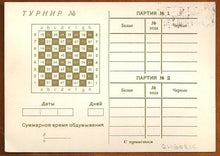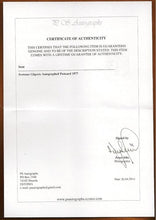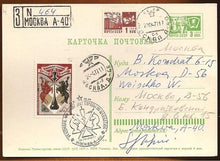Author: Svetozar Gligoric, (1923-2012) signed
Year: 1977
Publisher: Russian Chess Federation
Place: Moscow
Description:
One sheet card (4" x 6") with commemorative stamp affixed with special cancellation with letter of authentication. Postal chess for move (unused) on verso. Signed by Svetozar Gligoric in blue.
The European Team Championship is an international team chess event, eligible for the participation of European nations whose chess federations are located in zones 1.1 to 1.9. This more or less accords with the wider definition of Europe used in other events such as the Eurovision Song Contest and includes Israel, Russia and the former Soviet States. The competition is run under the auspices of the European Chess Union (ECU). The idea was conceived in the early 1950s, when chess organizers became aware of the need for another international team event. Consequently, a men-only Championship was devised and held every four years, with the intention of filling in the gaps between Olympiads. More recently, the Championship has grown in importance and popularity and is regarded as a prestigious tournament in its own right, providing for male and female participants. The first Championship Final was held in Vienna and Baden bei Wien in 1957 (August 22–28). It was a double round robin and notable for the surprise victory of the Yugoslav team over the mighty Soviet team in their second encounter. For the next twenty years, Championships occurred at four-year intervals, although the Kapfenberg event was delayed by a year. Since 1977, successive tournaments have mainly been held on a three and then a two-year cycle. A Women's Championship, following the same cycle and venues as the men's, was established at Debrecen in 1992. Over the early years, the formula altered incrementally, to allow the participation of a growing number of teams. At the inaugural event, only four places were made available for the Finals and some teams expected to do well, simply failed to qualify from the preliminary rounds. By 1973, the competition had expanded to roughly double the size and there were twenty-four nations in the preliminaries, competing for eight places in the Finals, held in Bath. Conversely, over the same period, the number of boards played in a match was reduced from ten to eight, presumably to reduce costs for organizers and participatory federations. Into the new millennium, the format has changed radically and is now based on a Swiss system in nine rounds, on the model of the Olympiad, with one section for the men's teams and one section for the women's teams, considered as separate competitions. At Gothenburg in 2005, the men's competition comprised 40 teams (including Sweden B and Sweden C) and the women's competition, 26 teams (including Sweden B). Each round was contested over four boards and squads included a reserve. Historically, teams played for the pleasure of winning the Europa Cup, but nowadays this has been overshadowed by the popular medal-winning format of the 'Olympics' and Chess Olympiad. Gold, Silver and Bronze medals are awarded to the top three teams and also as board prizes for outstanding individual performances.
Svetozar Gligorić (Serbian: Светозар Глигорић, 2 February 1923 – 14 August 2012) was a Serbian and Yugoslavian chess grandmaster. He won the championship of Yugoslavia a record twelve times, and is considered the best player ever from Serbia. In 1958 he was declared the best athlete of Yugoslavia. In the 1950s and 1960s Gligorić was one of the top players in the world, and also among the world's most popular, owing to his globe-trotting tournament schedule and a particularly engaging personality, reflected in the title of his autobiography, I Play Against Pieces. (I.e., playing without hostility toward the opponent, or playing differently against different players for "psychological" reasons; playing the board and not the man.). In this, the VI European Chess Team Championship, held in Mosco April 13-24, 1977, he played for the Yugoslavia team on second board. The team placed third behind the Soviet Union and Hungary.
Condition:
Light edge wear else a near fine piece.
Year: 1977
Publisher: Russian Chess Federation
Place: Moscow
Description:
One sheet card (4" x 6") with commemorative stamp affixed with special cancellation with letter of authentication. Postal chess for move (unused) on verso. Signed by Svetozar Gligoric in blue.
The European Team Championship is an international team chess event, eligible for the participation of European nations whose chess federations are located in zones 1.1 to 1.9. This more or less accords with the wider definition of Europe used in other events such as the Eurovision Song Contest and includes Israel, Russia and the former Soviet States. The competition is run under the auspices of the European Chess Union (ECU). The idea was conceived in the early 1950s, when chess organizers became aware of the need for another international team event. Consequently, a men-only Championship was devised and held every four years, with the intention of filling in the gaps between Olympiads. More recently, the Championship has grown in importance and popularity and is regarded as a prestigious tournament in its own right, providing for male and female participants. The first Championship Final was held in Vienna and Baden bei Wien in 1957 (August 22–28). It was a double round robin and notable for the surprise victory of the Yugoslav team over the mighty Soviet team in their second encounter. For the next twenty years, Championships occurred at four-year intervals, although the Kapfenberg event was delayed by a year. Since 1977, successive tournaments have mainly been held on a three and then a two-year cycle. A Women's Championship, following the same cycle and venues as the men's, was established at Debrecen in 1992. Over the early years, the formula altered incrementally, to allow the participation of a growing number of teams. At the inaugural event, only four places were made available for the Finals and some teams expected to do well, simply failed to qualify from the preliminary rounds. By 1973, the competition had expanded to roughly double the size and there were twenty-four nations in the preliminaries, competing for eight places in the Finals, held in Bath. Conversely, over the same period, the number of boards played in a match was reduced from ten to eight, presumably to reduce costs for organizers and participatory federations. Into the new millennium, the format has changed radically and is now based on a Swiss system in nine rounds, on the model of the Olympiad, with one section for the men's teams and one section for the women's teams, considered as separate competitions. At Gothenburg in 2005, the men's competition comprised 40 teams (including Sweden B and Sweden C) and the women's competition, 26 teams (including Sweden B). Each round was contested over four boards and squads included a reserve. Historically, teams played for the pleasure of winning the Europa Cup, but nowadays this has been overshadowed by the popular medal-winning format of the 'Olympics' and Chess Olympiad. Gold, Silver and Bronze medals are awarded to the top three teams and also as board prizes for outstanding individual performances.
Svetozar Gligorić (Serbian: Светозар Глигорић, 2 February 1923 – 14 August 2012) was a Serbian and Yugoslavian chess grandmaster. He won the championship of Yugoslavia a record twelve times, and is considered the best player ever from Serbia. In 1958 he was declared the best athlete of Yugoslavia. In the 1950s and 1960s Gligorić was one of the top players in the world, and also among the world's most popular, owing to his globe-trotting tournament schedule and a particularly engaging personality, reflected in the title of his autobiography, I Play Against Pieces. (I.e., playing without hostility toward the opponent, or playing differently against different players for "psychological" reasons; playing the board and not the man.). In this, the VI European Chess Team Championship, held in Mosco April 13-24, 1977, he played for the Yugoslavia team on second board. The team placed third behind the Soviet Union and Hungary.
Condition:
Light edge wear else a near fine piece.







